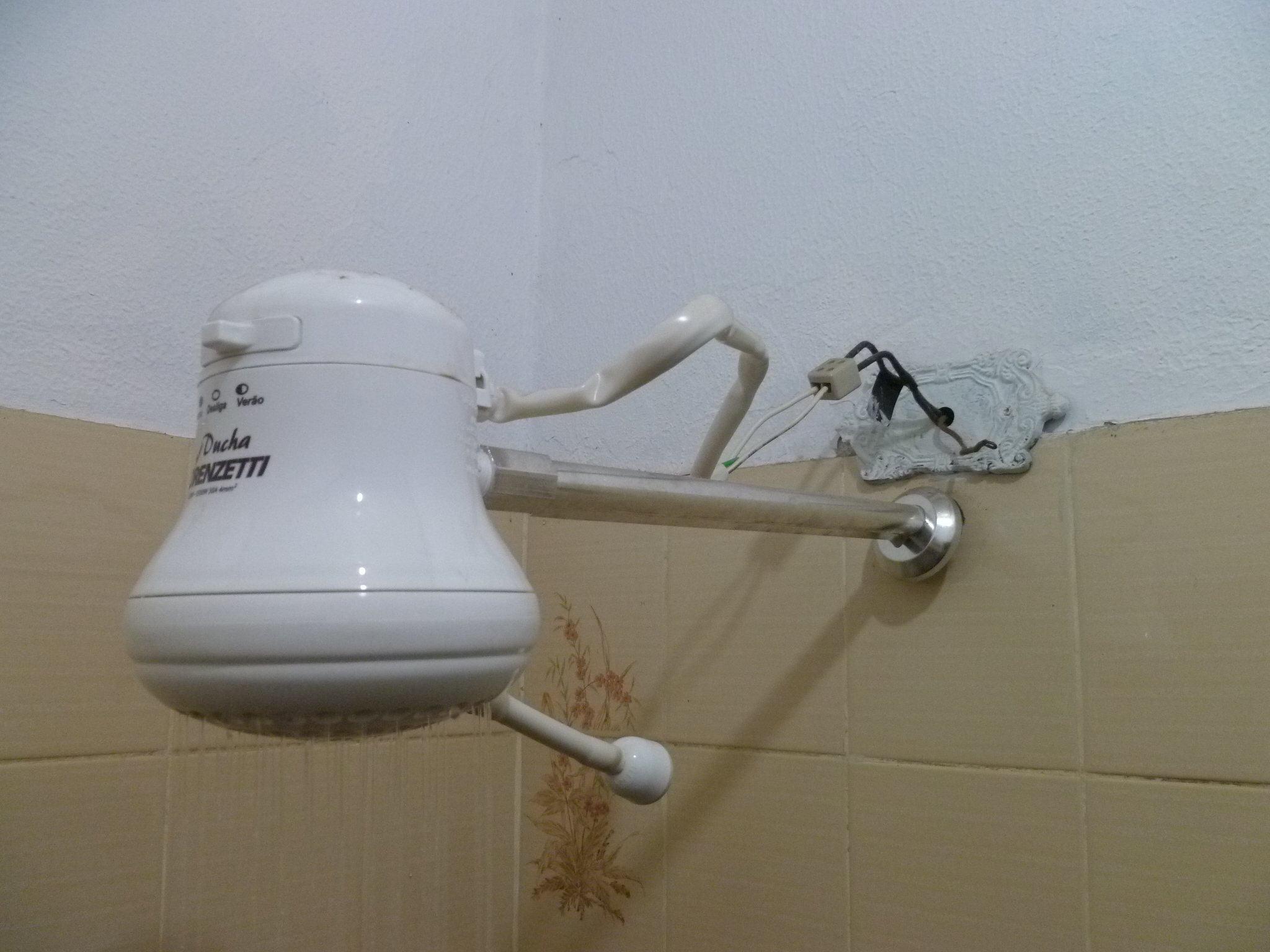Playing it safe with electricity in Brazil
127v / 220v - One thing that everyone coming to Brazil should be aware of is that there is no national standard voltage for residential buildings in Brazil. Some cities/states have 127v, others have 220v and others still have a mixture of both. One needs to be extremely careful with electical appliances as a result since electrical outlets are almost never marked to indicate the voltage in that circuit. Plugging in a 220v appliance in a 127v circuit is not a big problem, it just won't work. However, plugging a 127v appliance into a 220v outlet could have fatal results. If in doubt always ask somebody before you plug something into an outlet.There is now a national standard three prong plug and outlet for residential use in Brazil, however this is just recent so you'll find them in only newer buildings. There was no requirement in the law for retrofitting existing buildings with new outlets and as a result there are a great number of very different outlet types in use. While three prong plugs and outlets are now standard, most buildings do not have any ground wires to outlets, construction continues to be two cable wiring service only so don't count on the protection from electric shock that properly grounded outlets provide anywhere in Brazil. Unlike most other nations there is no restriction or special requirements for electrical outlets in bathrooms or other locations where water is also in use such as sinks, washing machines, swimming pools, etc. In North America at least you cannot put an electrical outlet in these locations unless it is the Ground Fault Interrupter (GFI) type. Here in Brazil anything goes so you must be extremely careful.
 Showers - most residential construction does not have piped hot water systems so you will most often find electric showers that heat water as it passes through an internal element. In almost every place I've ever been the shower wiring is precarious at best, often completely exposed so extreme caution is necessary to avoid a potentially fatal electric shock. First of all NEVER change the heat setting switch or disconnect the switch without first shutting off the flow of water.Other precautions that should be taken since most of these contraptions are not grounded is to never simply grasp the water shut-off valve, touch it lightly first to make sure you're not going to become part of the circuit of an ungrounded shower. While most of the newer construction uses PVC piping the water itself carries enough of the current from a faulty shower head that touching the valve could give you a serious electric shock. If you in an older building using iron pipes it could be fatal. Always wear flip-flops (called chinelos here) when using this kind of shower. Even though you'll be wet and some current will pass, they could save your life. There's an old wives tale (mostly in the Northeast - Bahia especially) that if you take a shower after a big meal you could die. I'm sure that superstition is the result of people who have actually died of an electrical discharge and not because they've eaten.
Showers - most residential construction does not have piped hot water systems so you will most often find electric showers that heat water as it passes through an internal element. In almost every place I've ever been the shower wiring is precarious at best, often completely exposed so extreme caution is necessary to avoid a potentially fatal electric shock. First of all NEVER change the heat setting switch or disconnect the switch without first shutting off the flow of water.Other precautions that should be taken since most of these contraptions are not grounded is to never simply grasp the water shut-off valve, touch it lightly first to make sure you're not going to become part of the circuit of an ungrounded shower. While most of the newer construction uses PVC piping the water itself carries enough of the current from a faulty shower head that touching the valve could give you a serious electric shock. If you in an older building using iron pipes it could be fatal. Always wear flip-flops (called chinelos here) when using this kind of shower. Even though you'll be wet and some current will pass, they could save your life. There's an old wives tale (mostly in the Northeast - Bahia especially) that if you take a shower after a big meal you could die. I'm sure that superstition is the result of people who have actually died of an electrical discharge and not because they've eaten. Hair straightening iron/flat iron or curling irons - Ladies please do not use one of these in a bathroom in Brazil, nor in any other humid environment. Never under any circumstances use one while your body is wet after bathing and always wear proper footwear, not flip-flops. There have been two cases within the past month of young women killed by electric shocks while using a "chapinha" while wet and barefoot. A very high price to pay for a pretty hair style if you ask me.
Hair straightening iron/flat iron or curling irons - Ladies please do not use one of these in a bathroom in Brazil, nor in any other humid environment. Never under any circumstances use one while your body is wet after bathing and always wear proper footwear, not flip-flops. There have been two cases within the past month of young women killed by electric shocks while using a "chapinha" while wet and barefoot. A very high price to pay for a pretty hair style if you ask me.
Lightning storms - if possible unplug all appliances, televisions, etc. during severe lightning storms. Since most homes are only two wire construction without grounding a direct hit could cause a television or other appliance to explode causing serious injury and subtantial damage to the building itself. If possible disconnect (fixed) telephones as well and never answer a ringing (fixed) phone during a lightning storm or if you're wet from bath or pool since the ringer is 127v and could kill you.Multiplug blocks, extension cords, etc. - avoid using plug blocks (called benjamins here) at all costs, you will end up overloading the circuits here and run the risk of setting your place on fire.
Outdoors, while in the streets especially during a rain NEVER touch metal signposts, light standards, metal fences or the like. There have been many cases of people being electrocuted because they touched something that was electrically charged, had it not been raining they might not have received a shock but since it was they became part of the circuit and were killed.
Children - be extra vigilant with small children while in Brazil. Plug outlet protectors are almost unheard of here and children can be extremely curious. Watch them closely so they don't poke sharp objects into plug outlets and get an electric shock as a result.
Agreed!
The wiring standards here just do not exist.
Don't touch any metal.
Don't touch anything wet.
Do Not Touch Wet Metal!!!
Better yet, don't touch Brazil period. 
Very informative, James. I never felt so unsafe in a shower in my life.
I'm in the process of re-wiring my house and it is a night mare. Every color in the rainbow for wires..lol . No electric showers though!! They were the first to be ripped out of the walls. Bosch propane fired tank less water heaters with a 200 liter solar boiler on the roof. Strange to set your solar to the north!!
I fried a brand new Electrolux by plugging it into a 220v outlet. No clue it was a 220!!
Read and take Mr Woodwards warnings seriously!!!
The only one I'd be more afraid of would be at the Bates Motel!!.
Norman Bates was actually a Brazilian orphan who was adopted and taken back to the USA. Hitchcock just left that part out of the movie.
My friends, you are right, we are in a constant danger, inside our home.
But what is more interesting is that to the people that born and live here in Brazil, all this do not exists.
Certainly because they do not know other situations
You guys came to Brazil with a pattern that is normal for you but here the normal for you is the best we can do, and some times nether
When I came back to Brazil I could feel exactly what you are talking about.
You are write, take care.
Another real concern in Brazil is that of the all too frequent power outages. Even in major Brazilian cities like São Paulo, Rio and Belo Horizonte not a week goes by that the power doesn't go out at least once. The first sign of rain and you can guarantee you're going to need to rush and find where you've hidden all the candles.
Even when they do the right thing here in Brazil they do it all wrong. In Macaé where I live the electric company Ampla undertook what is without a doubt the largest private infrastructure project I have seen anywhere in Brazil in all the years that I have lived here. I live in what is without any doubt the largest district in the Macaé municipality and Ampla replaced every single power pole and light post, every millimeter of the overhead electrical wiring system in the whole district. I'm sure this project must have cost billions. Absolutely EVERYTHING is brand spanking new. Yet, the constant power outages have not stopped nor even been reduced. Why? Simple, the problem was not the electrical network within the region, but rather the distribution network that brings electrical power to the area. None of that has been maintained or updated. So who in their right mind can expect this project to have made any difference. It was all done for show, and for tax reasons. It was done simply because it was a high profile works project that the general public could see as opposed to working on the distribution system which people can't see, but would have done ten times more to resolve the problem of blackouts. I still haven't thrown away the candles nor stopped using them with the same frequency as before.
I have updated my new favorite thread "You know you are in Brazil when..." to reflect my experiences with the electricity in Brazil, specifically the Amazonas which does not seem to be the only location with outages!
This thread really should be a sticky James as I had similar issues and concerns when I had moved to Brazil.
Look at this photo, this is exactly what most power poles look like in all major urban areas throughout Brazil. They look like somebody just dumped a spool of electrical cables on top of the pole and left it there. This is the condition that the utility companies leave the poles in so just imagine what others look like with all kinds of clandestine hook-ups on top of all the legitimate ones.
This is why I warned in the first posting of this thread never to touch power poles, lamp posts, street signs, metal fences or anything else in the streets especially during a rain. Everywhere you go you will also find wires simply laying on the ground, there is no way of telling if they are just abandoned telephone lines or electric cables that may still be live. Use extreme caution and steer clear of them.
This photo may represent the power poles in Brazil but it kind of reminds me of the government and its bureaucracy - complicated.
In Manaus, the power was out so much I would be okay with doing a pole dance in the rain. 
I no sooner post this topic and the photo of the bird's nest of wires on the power pole and yet another innocent child, 11-year old Ênio Marcondes Ferreira de Brito of Paulista (Grande Recife) - PE, is electrocuted when he stepped on a live wire that had fallen from power pole that looked exactly like the one in the photo. A sad story the keeps repeating like it was recorded on an endless tape.
VERY TRUE! In Goiania, where I live, the voltage is 220V, yet the outlets are the same as in cities where the standard is 110V. Deaths by electrocution are fairly common because of exposed live wires. The are usually described in the news as "fatalidades", hardly ever the lack of care that caused them is emphasized. Having said that, I want to add that electrically heated shower heads, in my opinion, are a good idea. Properly installed they are much preferable to the centrally heated water that often takes several minutes to reach the bathroom.
Very good topic. I live in Manaus and what electrical code there is here is never enforced a large section of wooden housing here burned down the cause was faulty electrical wiring there weren't many casualties however the loss of the housing to these poor families was substantial most lost everything they owned.
In the US the electrical code is so strict that i believe if they used half of the code as used in the US here most buildings could not pass an electrical inspection. Plus there is a strict adherence to color coding of wires with white always being neutral, green always being earth ground and Black or other colors always hot leads., here it could be any color and any size no matter what current the wire is supposed to be carrying
In the US ground wiring is required in all new construction and on any new wiring installed. The reason for this is simply to prevent electrical fires and electrocution.
Another thing I noticed here recently a 50 amp main breaker kept tripping in the building I live. The cure they decided on was to install a 70 amp one. Never mind that the wire will only handle 50 amps maximum. It is a good thing the building here is concrete so the only thing that would happen is the wiring insulation would melt from the heat and possibly catch fire.
Having worked as an electrician in the US I am especially sensitive to what is safe wiring practice.
Does anyne know where I can get a cheap version of a UPS uninterruptible power supply because I'm living in Embu and we get a lot of power cuts here and I'm worried that it's taking it's toll on my electronics! it's not only the power going but there is a lot of dropping power where it flickers off for a second then back on!
You'll find a full range of power stabilizers and no-breaks at all Kalunga Stores, they've got locations all over Greater São Paulo. Visit their site:
www.kalunga.com.br
Cheers,
William James Woodward, Expat-blog Experts Team
Let us also not forget, Brazil uses 60-cycle alternating current, as does the USA, while most of the world uses 50-cycle alternating current. Light bulbs, computers, computer chargers, and phone chargers, etc., are fine. However, A/C electric motors, such as blenders, hairdryers, power tools, etc., designed for 50-cycle current are not going to work, at either voltage. If they turn on at all, they will be working at an increased speed and under a higher initial load which will burn them up. http://www.gohz.com/can-a-50hz-machine- … wer-system
torstenmansson wrote:Hi James, really great post if a little unnerving! I am moving to Rio de Janeiro this April 2021 from London, England, (packing as we speak including a number of lights). My query relates to electronic goods. The voltage in the UK (and Europe) is 230 volts. I had previously understood that Rio had standardised its voltage to 220V. I wondered the following:
1) Will my lights work without issue in Rio?
2) Would I be able to change the plug from a UK version to a Brazilian version?
3) Is there such a thing as an 'electrical safety certificate' provided when buying an apartment?
(I am very please to have just stumbled upon this site [and forum] and look forward to having a good around). Many thanks once again, Tor
Welcome, Jame (RIP) passed in a violent shooting a few years ago.
You will need 220V in Brazil to use most of your lights. BR has both 110 and 220v. Also, Brazil is LED and has very few incidences of bulbs. Most outlets are two or 3 round prong. All new appliances are 3 prongs for grounding. Many sell adapters 3 to 2, but not the best way.
https://www.power-plugs-sockets.com/brazil/
One of the first things I found was USA plugs do not work, so I got adapters. After many years in Brazil, I have purchased new electronics and appliances and all come with 3 prongs, so I had an electrician change most all plugs. (Have 3 USA/BR outlets,
I am not a Rio expert to answer what and wherein Rio the transmissions are.
Yes, you can change plugs, I would recommend having an electrician do all the modifications. I love 220, but I am a"sissy" and will not touch a 220.
torstenmansson wrote:OMG, so sorry to hear that - do you the circumstances of his death? Really helpful re the electricity. Many thanks
James was murdered. Whether he was simply in the wrong place at the wrong time or there was more to it was never clear, and probably never will be.
The crucial fact is that Brazil is a very dangerous place. Street crime, break-ins, and burglaries are facts of life in all Brazilian cities, and have only gotten worse as the pandemic has made people more desperate. Outside the main tourist areas, and often inside them, the police have little control. The worst of the violence tends to bypass foreigners, as long as they keep to safe places and remain alert at all times -- but not always.
Knowing Brazil well does not lessen the risk: in fact, it can increase it. Those of us who speak fluent Portuguese and think that we understand the culture can easily become complacent and develop a false sense of security, thinking that we blend in and can go anywhere we want. We don't, and we can't; foreigners are always visible and noticed, and in too many places, will be seen as soft targets.
I don't say this to scare you off, but to stress the need for constant vigilance, particularly since you'll be living in Rio de Janeiro. As it happens, just this morning on Portuguese Quora, I saw a Brazilian cartoon labeling different regions of Brazil with the areas of the world that the cartoonist identifies them with. The North, where I live, was labeled "Africa". The Northeast was labeled "Mexico". The South was labeled "Europe". And Rio? That was labeled "Gaza Strip". A humorous exaggeration, certainly, but not without its grain of truth.
I am planning to replace the existing 220v wiring in my Brasilia apartment with dual 220v and 127v wiring, panelboards, and dual wall sockets, with 10 ma gfci in the kitchen and bathrooms. From reading the comments above, I will request the electricians use the universal wire color codes, ground all circuits, use wire larger than 2.5mm, and enclose (but make accessible) the electrical heated showerhead wiringSome questions:1. Do they have 'dual' wall outlets there, or do I need to have them install a 220v outlet side-by-side with a 127v outlet?2. Can I get them to install the wall sockets at 24" (60cm) off the floor like in the US, or do they have to install them about a meter of the floor like I have noticed in most Brazilian residences?- @EricPau
05/09/22 Thanks Mike. If flooding reaches up to my apartment on the 12th floor, we're gonna have bigger problems than my electricity! LoL- @EricPau
Tô EricPauRead your post. 1.5 is typically the problem. The wire companies Prysiam has good web sights. 2.5 mm works for lights and wall souckets. Also used 4mm for the kitchen and AC. Only 9000btu splits. 6mm for electric shower heads. All lighting is Led Phillips. New specification AC coming out this year.and in 2025. Some companies Dainkin and Media have some models that meet this. Even inverter window Ac by Consul may be showing up.Have not seen 10ma Drs I am 220 volt. I would prefer this on circuts for washin machine and electric showers. One trouble spot could be gas stove flame igniter may trip the DR.I have been using Fujitsu, and Dainkin split AC up to 24000btu. The new model Dainkins will most likely be the replacements. Check out searching Inmetro web sites and ABNT web sites ABNT are Brasialin standards can be useful.Most of the wire will be strands, not solid. Use tubular connections on this. I went out and bought the tubulares and a crimping tool. Still have them. If you follow color codes you will be buying 9 rolls of wire. It adds up. I go for the most energy efficient equipment in this market. Intend to go solar. Hope to take the collective energy of condominium solar. Gfci, DR is a good idea for swimming pool pumps and others. Elevator controls should have DPS and DR very expensive to cook. Lightning is the usual reason, power surges in Recife have been a large problem. One condo in my neighborhood electrocuted an employee reciently OUCH! One idiot in my condo installed a non weather proof socket 1 meter from the swimming pool.Took a while to get the condo to remove it. Proper ip66 water proof boxes are expensive, hard to find. With gfci. Must be imported as far as I know. Wold like to find a source.Thank you- @gordongpatton
The most ironic part of seeing these utility poles with spaghetti look like wiring, is that...
@James Great read! “In almost every place I've ever been the shower wiring is precarious at best, often completely exposed so extreme caution is necessary to avoid a potentially fatal electric shock.”
I was like what the hell is this the first time I saw the electric showers.
@James Reminds me of a lot of areas in São Paulo
08/30/22 @John Unhappily, James died in 2016. He wrote extensively and with great knowledge. The laws on visas and immigration have changed a great deal since his death and much of his advice that was valid at the time is now outdated; on most other topics, though, his work continues to be a reliable source of information and guidance.
@abthree Sad to hear that. At least his helpful knowledge lives on!! I’m sure he would be happy about that.
@James
Hi there i’m from the United States. I’ve been living here in Brazil for the past six or so years. I’ve experienced most everything with the electrical, except for a fatal shock. thank God… The problem here in Brazil is they don’t follow the European codes very well. Their manual (Brazil) is about 10 pages thick and they all think they’re master electricians. So you don’t think I’m talking out of thin air. I have a master electrical license in the state of New Mexico. It’s one of the hardest of two states in the US to receive this license and I can tell you from experience talking and working with some of them that they considered themselves an electricians . Don’t get me wrong. I have seen some installations that were done well But most have been very poor.
Those electric showers scare me too. I see that they have some kind of ceramic connector that is exposed with no electrical tape. Why do they use this instead of just directly connecting the wires and wrapping with electrical tape to at least provide some protection from splashing water?
I was badly shocked by an improperly installed cook top range in an airbnb in Rio. Luckily was wearing sneakers or I think I may have been a goner.
@marcotenore To simplify - electric showers should be wired directly through a 20A socket with a nearby on/off switch that can be accessed before the shower, plus a further trip switch - by Brazilian law. Additionally you should make a habit of turning up the heat before turning on the water, then turning off the water before reducing the heat back to the zero setting. (Apart from the very first time you use it).
That is because there is a rotary pressure switch inside the shower that cuts off the electric if the water is not running, so no danger of shock if it is correctly wired. Avoid any shower that has 2 wires connected with insulating tape....
Thank you for that. All mine are three wires with insulating tape. No switch. Should I have the connections changed to the porcelain block?
Make your relocation easier with the Brazil expat guide

Accommodation in Rio de Janeiro
With an official population of about seven million people, and almost twice that number in the metro area, Rio de ...

Childcare in Brazil
As more and more women have joined the workforce in Brazil, childcare has become very important. There are a few ...

Accommodation in Brasilia
Brasilia, the country's federal capital, is home to many highly-paid government employees and foreign ...

Working in Curitiba
Curitiba attracts many foreigners, who come both for work and because Curitiba offers a high standard of living. ...

Customs in Brazil
Visitors to Brazil and returning residents of Brazil are permitted to bring in personal possessions and items for ...

The Brazilian labour market
In recent years, Brazil suffered through an economic recession and a government austerity program. Still, Brazil ...

Using phones in Brazil
It's much easier these days to get a cell phone in Brazil, and phones and calling plans are inexpensive. ...

Marriage in Brazil
Brazil can be a romantic country, and you may want to marry here. Perhaps you even want to remain in Brazil ...
Forum topics on living in Brazil



